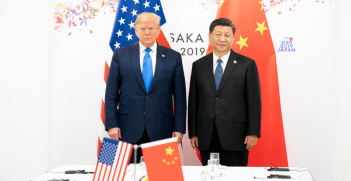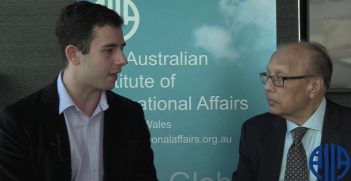Like a Tidal Wave: Coronavirus in Countries Already Facing Development Challenges

Countries facing the biggest development challenges are the most vulnerable to the spread of COVID-19. It is hard to imagine how they will cope with a pandemic of this scale when the healthcare systems and economies of the world’s wealthiest countries are struggling.
It hit the poor particularly ruthlessly, thriving on conditions in which they lived. . . . Wherever it appeared, it tested the efficiency and resilience of the local administrative structures. It exposed relentlessly political, social and moral shortcomings. — Asa Briggs, writing on cholera in Past and Present, 1961
First, invest in building resilient communities and well-performing health systems that integrate public health and primary health care. Ideally, health systems should aim for universal health coverage, so the poor are not left behind. This requires new thinking and a new approach to health development. —Dr Helen Chan, former WHO Director General, 2015
There have been repeated warnings from those grappling with the fallout of past pandemics and future planning about countries facing poverty, disaster, conflict, or other humanitarian crisis. In these places, resources, capacity, resilience, and often security and governance are already severely depleted. Health systems, including disease surveillance, are often woefully inadequate. There are a large number of vulnerable people living in overcrowded and unsanitary conditions, or with insufficient access to food and healthcare.
However, just when more support and collaboration is needed, attention and resources are being redirected to crises “at home” and lockdowns are hampering relief efforts. Many humanitarian and development actors are prevented from accessing communities in need and are facing unprecedented coordination, logistical, and financial challenges. Consequently, efforts to address the very things that make these countries more vulnerable to COVID-19 are curtailed.
COVID-19 is Compounding Insecurities in the World’s Poorest Countries
In overcrowded slums, informal settlements, and refugee and internally displaced person (IDP) camps, the poorest and most vulnerable people cannot self-isolate or socially distance themselves from others. Running water and soap have been hard to come by, even before anyone had ever spoken of COVID-19. Many people face the choice between “a greater risk of catching and spreading disease or the certainty of hunger” because they need to go out each day to earn money to buy food, and because getting food often requires a walk and standing in long queues. In Moria Camp on Lesbos, Greece, the 20,000 asylum seekers cannot socially distance squeezed into a camp that accommodates 3,000 and where they must queue for hours each day for basic food supplies. The concept of self-care in these contexts “is a luxury.”
The millions of people who live in slums, informal settlements, and displacement camps often have limited access to healthcare and essential services. They suffer ill health as a result of living in overcrowded and unsanitary conditions. These factors harm their immune systems, increasing their risk of dying from COVID-19. Insecure housing in many countries also deepens the crisis for many, as in South Africa, where forced evictions of shack settlements continue unabated.
COVID-19 and Socio-Economic Inequalities
COVID-19 exposes and increases extreme socioeconomic inequalities. People who are socioeconomically marginalised are most likely to be exposed and vulnerable to the virus, and least likely to be able to access healthcare. Alongside those living in informal settlements and insecure housing, this includes people who are homeless with nowhere to self-isolate, squeezed into small spaces with other families, and incarcerated in overcrowded prisons. Others include those who cannot afford health insurance, do not have enough cash to stock up their cupboard, or do not have anywhere to store food. Some lack access to information, which can help guard against infection and the spread of the disease, because they are denied or cannot afford telephone or internet coverage, such as Rohingya in Cox’s Bazar.
COVID-19 has yet to take firm hold in some of the poorest countries, but some of the hardest-hit places appear to be the poorest neighbourhoods in cities such as New York and New Orleans. Secretary General of the International Federation of Red Cross and Red Crescent Societies (IFRC), Jagan Chapagain, said, “We all know the virus doesn’t discriminate, but its impact on the most vulnerable people is highly discriminatory.”
Oxfam has said the pandemic could increase global poverty by half a billion people. The IMF Director has warned that the ensuing economic recession will be the greatest witnessed since the Great Depression and that it will hit “emerging markets and developing countries hardest” because they will be unable to invest heavily to recalibrate their economies. This will further impoverish people in these places and expose them to other threats for which there are insufficient resources for prevention or response.
Already COVID-19 response measures have thrust millions of workers who live hand-to-mouth on daily wages into homelessness and starvation. This was starkly demonstrated by the throngs of migrants leaving Mumbai for their rural homes, no longer able to provide for themselves or their families and potentially walking the virus back to these homes. In places such as Nigeria and the DRC, it is hunger not the virus, that is feared if people can’t go to work. Most of the affected people work in the informal economy, which provides little social protection. Some of these workers, such as street vendors and waste pickers, provide essential services at high risk to themselves.
While significant funding for countries facing development challenges is being called for, it is unlikely to be sufficient. Already, resources and attention are being reoriented away from issues unrelated to COVID-19 and medical supplies are being diverted to wealthier nations. International funding will become increasingly difficult to secure as countries focus on their own fight against the virus and as the anticipated global recession takes hold.
There are lessons to learn from previous pandemics, including the need to act swiftly, plan thoroughly, and communicate effectively; invest in robust health systems worldwide; not neglect other development challenges and humanitarian needs unrelated to COVID-19; and recognise and support sources of community resilience.
Unless the particular vulnerability of countries already facing development challenges is quickly and comprehensively addressed, the results will be catastrophic. UN Secretary-General António Guterres warned, “If we let coronavirus spread like wildfire — especially in the most vulnerable regions of the world — it would kill millions of people”. Many thousands more will die from other diseases, as occurred during the outbreak of Ebola in West Africa, because healthcare resources will be further stretched. Severe economic shocks, unemployment, migration, heightened food insecurity, and other stressors will increase as a result of COVID-19. This will, in turn, undermine the capacity of these countries to respond to development challenges, including those posed by COVID-19. These effects have global implications, posing threats to broader international peace and security, as well as compromise efforts to contain COVID-19 within and beyond these countries’ often-porous borders.
Reporting on the likely socio-economic impact of COVID-19 and calling for solidarity between the world’s developed and developing countries, Guterres warned “we are only as strong as the weakest health system in our interconnected world.” Crucially, he called for a new economy to emerge from the recovery, which would lead to “more equal, inclusive and sustainable economies and societies that are more resilient in the face of pandemics, climate change, and the many other global challenges we face.”
Dr Eleanor Gordon is a senior lecturer in politics and international development, member of the Monash Gender Peace and Security Centre, and Deputy Director of the Master in International Development Practice programme at Monash University.
Dr Samanthi J. Gunawardana is a senior lecturer in gender and development in the Faculty of Arts at Monash University and a member of the Monash Gender, Peace and Security Centre. She is the Director of the Master of International Development Practice.
This article is published under a Creative Commons Licence and may be republished with attribution.





